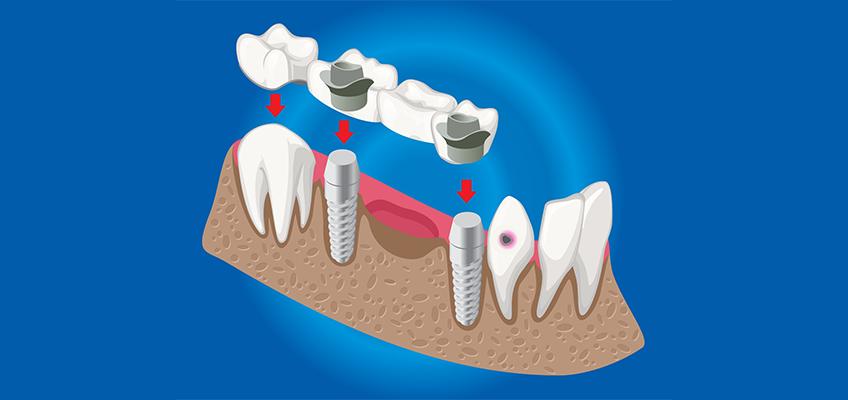Dental implants are man-made roots for teeth that support the replacement of a tooth or bridge. They consist of biocompatible materials, usually titanium, that fuse with the jawbone, creating a stable base for the new tooth or bridge.
Dental implants are a preferred option as they mimic natural teeth in appearance and functionality. They are also long-lasting, strong, and easy to maintain.
Dental implants can help improve oral health by preventing surrounding teeth from shifting and causing alignment problems that could lead to further dental issues.
Unlike
dentures and bridges, dental implants provide a natural look and feel. They are anchored into the jawbone, offering a secure and comfortable fit that enables the individual to eat and speak confidently.
In addition to their practical benefits, dental implants can have a positive impact on one's self-esteem. A complete and healthy smile can improve one's confidence and overall quality of life.
Neurological disorders:
Neurological disorders come in various forms, each with its distinct causes, symptoms, and treatment methods. Common neurological disorders include headaches, seizures, Alzheimer's disease, and multiple sclerosis, with factors such as genetics, infections, trauma, and environmental toxins contributing to their development.
The symptoms of neurological disorders can vary depending on their type and intensity and may include cognitive difficulties like memory loss, confusion, and speech impairment, as well as physical symptoms like numbness or tingling, muscle weakness, and tremors or seizures.
What is the potential link between dental implants and neurological problems?
Limited and inconclusive evidence exists regarding the potential correlation between dental implants and neurological issues like neuropathy, neuralgia, dental nerve damage symptoms, and multiple sclerosis, as suggested by some research studies.

1. Neuropathy:
Neuropathy refers to a medical condition that impacts the nerves, resulting in sensations of numbness, tingling, and pain. The condition can be brought on by a range of factors, such as infections, chemotherapy, and diabetes.
2. Neuralgia:
Neuralgia is a medical condition characterized by excruciating pain in the nerves. Several factors, such as nerve damage, infections, and autoimmune disorders, can lead to this condition.
3. Sclerosis:
Multiple sclerosis is an enduring autoimmune ailment that impacts the central nervous system, inducing symptoms such as numbness, coordination loss, and weakness.
What is the current scientific evidence on the link between dental implants and neurological problems?
Scientific research into the possible relationship between
process dental implants and neurological issues and the question of that can dental implants cause permanent pain is currently limited and lacks conclusive evidence. Some studies suggest a potential correlation, while others have found no such association.
There are various mechanisms that could explain the suspected link between dental implants and neurological problems, such as the release of metal ions, disruption of the oral microbiome, and immune response to the implant. Metal ions are electrically charged particles emitted from metal implants, including dental implants, which can lead to biological reactions such as inflammation and oxidative stress. The impact of metal ions on the nervous system can cause damage to nerve cells, leading to functional disturbances.
The immune response to dental implants is a complex process that involves the activation of immune cells such as macrophages and T cells. This immune response can adversely affect the nervous system, potentially leading to neurological problems.
How can the immune response to dental implants affect the nervous system?
The immune response triggered by dental implants can impact the nervous system in multiple ways. One such manner is through the induction of inflammation within the body. Inflammation can result in oxidative stress, which can damage nerve cells and contribute to the development of neurological conditions, like Parkinson's disease and Alzheimer's disease.
Inflammation is a natural response by the body's immune system to injury or infection, serving to safeguard the body by eliminating damaged tissue and battling pathogens. Nevertheless, prolonged or chronic inflammation can adversely affect the body and potentially result in various health problems, including neurological disorders.
FAQ
There is a slight chance that dental implants could harm the nerves responsible for sensation in your face and gums. There's also a possibility of damaging surrounding structures, such as adjacent teeth or blood vessels. Nerve damage, if it occurs, could result in symptoms like pain, numbness, or tingling.
Based on a 2017 review, it may take approximately 5 years for peri-implantitis to develop and show symptoms. These symptoms commonly involve bleeding or swelling around the area of the dental implant. Additionally, there exists a rare chance of the body rejecting the dental implant.
Painful post-traumatic trigeminal neuropathy (PTTN) is a recognized issue that can arise from dental implant treatment. Apart from instances where nerve damage occurs during surgery or implant placement, some patients experience neuropathic symptoms later, specifically after the crown is placed on the implant.
Numbness typically occurs on the side where the implant is positioned, affecting areas like the lower lip and chin. Another sign of potential nerve damage is sensations such as tingling, tickling, or a burning feeling on the skin, known as paraesthesia. In certain instances, numbness might not manifest immediately but develop later on.
Conclusion
There is currently no evidence indicating that dental implants have a significant negative impact on the nervous system. On the contrary, dental implants can enhance the quality of life for individuals who have lost teeth, enabling them to eat, speak, and smile confidently. If you are contemplating dental implants, it is recommended to seek advice from a qualified dental professional who can assist you in making an informed decision about your treatment alternatives. According to research, nerve damage during dental implant surgery is rare, and if it does occur, it is usually short-lived and resolves on its own. Additionally, the materials utilized in dental implants are generally biocompatible and safe, implying that they are unlikely to elicit any negative reactions or harm the nervous system. Of course, similar to any medical procedure, there is always the possibility of complications. However, when dental implants are administered by a skilled
dental implant specialist, the risks are minimal.


